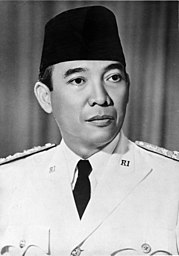Sukarno Achmed Horoscope

Sukarno Achmed
Jun 6, 1901
Rating : B (Data from a less reliable source)
Capricorn
Moon Sign
Taurus
Sun Sign
Taurus
Lagan
 Events
Events
Family : Change residence 1933 (Exiled from Java by Dutch authorities in 1933.)
Work : Lose social status 1933 (Exiled from Java)
Work : New Job 1949 (Head of State of Indonesia)
Work : New Job 1963 (President for Life of Indonesia)
Work : Lose social status 1965 (Lost President for Life position)
Death:Death, Cause unspecified 21 June 1970 (Age 69) chart Placidus Equal_H.
 Biography
Biography
Indonesian politician exiled from Java by the Dutch authorities in 1933. In 1942 he returned to the country and collaborated with the Japanese occupation force in power. Three years later he proclaimed Indonesia an independent nation, fighting against his old nemesis, the Dutch. On 12/27/1949 the Netherlands ceded sovereignty of Indonesia after a four year war; Sukarno was made head of state. In 1960 he suspended the Indonesian Parliament; three years later he was named President of the nation for life. In 1965 he lost his position, a testament to the instability of the nation at the time. Sukarno died on 6/21/1970, Djakarta, Indonesia. Link to Wikipedia biography Link to Astrodienst discussion forum Read less
 Latest Info with AI
Latest Info with AI
Update at: Jul 13, 2025
Sukarno Achmed (Soekarno)
Sukarno, born on June 6, 1901, in Surabaya, Indonesia, was a prominent Indonesian political leader and the first president of Indonesia. He played a key role in Indonesia's struggle for independence from Dutch colonial rule. While his date of birth is officially recorded as June 6th, some sources suggest he may have been born in March or April.
Political Career and Independence Movement
Sukarno's political activism began in the 1920s, where he advocated for Indonesian independence. He co-founded the Indonesian National Party (PNI) in 1927, which sought a united and free Indonesia. His nationalist activities led to periods of imprisonment and exile by the Dutch authorities. During the Japanese occupation of Indonesia in World War II, Sukarno collaborated with the Japanese, seeing it as an opportunity to advance the cause of independence. Following Japan's surrender, Sukarno and Mohammad Hatta proclaimed Indonesian independence on August 17, 1945.
Presidency and Guided Democracy
Sukarno served as Indonesia's first president from 1945 to 1967. He led the country through turbulent times, including the struggle against Dutch attempts to reclaim control and internal political divisions. In the late 1950s, Sukarno introduced "Guided Democracy," a system that concentrated power in his hands and suppressed political opposition. His rule was marked by increasing authoritarianism, economic instability, and complex international relationships during the Cold War.
Later Years and Legacy
In the mid-1960s, political instability and a failed coup attempt led to the rise of General Suharto, who gradually assumed power from Sukarno. Sukarno was placed under house arrest and remained largely sidelined from political life. He died on June 21, 1970, in Jakarta. Sukarno's legacy remains complex and contested. While he is revered by many as the "Father of the Nation" for his role in achieving independence, his later policies and authoritarian tendencies have been criticized. Information about Sukarno's personal social media presence is not applicable as social media platforms as we know them today did not exist during his lifetime. His speeches and writings, however, served as important forms of communication and continue to be studied.
Finding More Information
Extensive information about Sukarno's life and political career can be found in historical archives, biographies, and academic publications. Searching online using keywords like "Sukarno biography," "Indonesian independence," and "Guided Democracy" will yield numerous resources.
```
